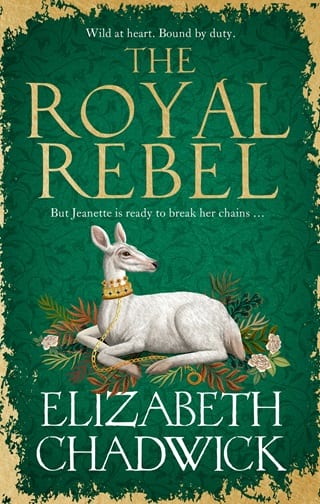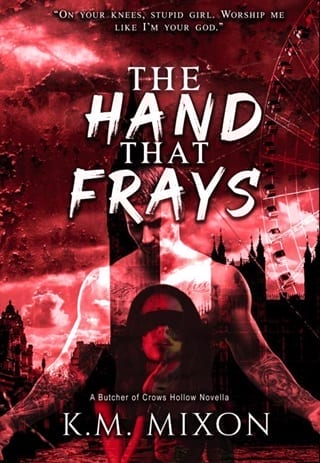22 Calais, Normandy, October 1346
22
Calais, Normandy, October 1346
The October evening carried a distinct smell of autumn in the air. In his tent outside the besieged walls of Calais, Thomas rolled his dice, and then snorted in disgust. He was playing with Otto and Raoul de Brienne, and Raoul was winning again. It amazed Thomas that his prisoner should be so fortunate with the dice, and yet deserted of luck at Caen – although perhaps the very fact that he had survived the slaughter was fortune enough. They were bidding for a fur-embellished cloak that was part of the campaign spoils. Black sable adorned the outer red wool, and glinted in the light of the lantern swinging from the tent roof.
Taking his turn, Raoul rattled the dice in the cup and threw a score that resoundingly beat both Otto and Thomas's efforts. With a triumphant shout, he fisted the air.
Thomas shook his head. ‘You always were a mean dice player, Raoul, but I shouldn't begrudge you. That cloak will come in useful during the winter!'
‘Hah!' Raoul rose and swept the cloak around his shoulders, fastening the red silk cords from which two tassels hung down.
‘Very fine,' Thomas said. ‘You wear it well.'
‘You are right that I find myself in reduced circumstances,' Raoul admitted, ‘but you are accommodating.' He looked at the brothers and folded his arms inside the garment. ‘Let me tell you this though: you will not take Calais easily – perhaps never. It is going to be a long winter for all.'
‘A good thing you won the cloak then.' Otto rose and rumpled his hair. ‘I'm for my bed.' Bidding them goodnight, he departed to his own tent where Thomas knew a rather delectable laundry maid was waiting for him.
Raoul removed the cloak and said, ‘I heard that Robert de Tancarville is to have his ransom set at six hundred marks. It is only a verbal agreement, but progress has been made.'
‘Six hundred?' Thomas raised his brows as he returned the dice to their ivory box.
‘Do you not think that a fair sum?' Raoul sat down and crossed his legs. ‘How much do you expect to get for me?' He smiled sourly. ‘Am I worth more or less?'
‘It is not as simple as that,' Thomas said, a cloud of frustration settling its weight on him. Every time he broached the matter of Raoul's ransom he had been deflected by officials and told the King was too busy to see him, and that the matter would be resolved in due course. He must be patient and they would discuss the sum at a later date. Nearly three months had passed since Caen, and still Thomas was no further along his path.
He knew why. Matters had been looking optimistic and he had been promised a review, but then Queen Philippa had arrived with her women, including the widowed Countess of Salisbury, and suddenly an audience with the King had become impossible to obtain. Jeanette had arrived with the ladies, but was so closely guarded by Katerine and Elizabeth that he could not get near her. Even in the Queen's presence, there was no opportunity for contact beyond glances. He had managed to pay a troubadour to pass a message saying he had hopes of resolving the situation, but he had no means of knowing if she had received it.
‘"Not as simple" – why?' Raoul asked. ‘Are you requesting too much? Can the King not afford to pay you?'
Thomas shook his head. ‘That is a part of it, but there are other elements at work – factions, you might say.'
‘Anything you want to tell me, since it affects me too?' Raoul asked.
‘There is nothing you can do, and telling you will make no difference to the outcome.' Thomas rose and went to wash his face and hands, ready to say his evening prayers. ‘I shall continue to work on the delay and ask God's help.'
‘Then I shall pray too,' Raoul said. ‘Much as I have grown fond of you, my place is with my own king.'
‘Yes, I know,' Thomas said quietly, and disappeared behind the curtain that partitioned his bed from the main part of the tent.
He didn't want to talk any longer. The evening's convivial conversation and dice playing were superficial pleasures that had swiftly dissipated, and he felt heavy and dejected. Tomorrow, he had orders to escort the Queen from Calais to Flanders under the Earl of Warwick's command, as part of a diplomatic mission. Making enquiries, he had discovered that Jeanette was remaining behind with the Salisbury household, including her cuckoo husband. Thinking about her with him sickened him, but he could do nothing until he had the ransom money to fund his legal campaign.
Kneeling at his bedside, he prayed for God to help him. God had brought him through fire and battle, and he had survived when so many times he might have died. Surely there was a moment of grace in all this striving.
After Caen they had moved along the coast, taking towns, plundering supplies, burning a swathe through the Norman countryside. King Philip of France had moved to intercept them and the two armies had clashed a month later in a field close to the small town of Crécy.
A stiff breeze billowed the outer skin of his tent, and in his mind's eye and memory it became first a storm wind and then the hissing of arrows darkening the sky across the battlefield. It became the thunder of bombards, roaring fire and smoke, sending iron bolts and balls of stone hurtling into the opposition. The screams of terrified, wounded horses and men, the smell of blood and entrails. He could feel the vibration of desperate battle. Behind his closed lids he saw again the French advancing at a pounding gallop, and the charge breaking up beneath the death storm of ten thousand arrows.
He had been on the right of the battlefield near the front with the Prince, watching from behind the massed lines of archers and men at arms. He would never forget the whistling thrum of the arrows flying from the bows, and the thud as they plummeted into horses and men. Nor those screams of the wounded and the dying, some of them in their own line as bolts from the Genoese crossbows found their mark.
At one stage a French charge had reached their lines and powered forward. The Prince's standard had gone down for an instant, immediately snatched up again, and Thomas and Otto had fought like furies to protect their young lord, and forced back the opposition. In the mass of the melee, side by side, they had faced death, looked into the eyes of the reaper, and beaten him aside. He would come for them eventually, and for their prince, but not this day.
The final effort for the French had been a charge led by Jean of Luxembourg, King of Bohemia. Ancient and almost blind, but brimming with ferocity and courage, he had had his men tie their horses together with him at their centre and ride forward all as one. Inevitably they had been brought down and killed, right in front of the Prince's line. Thomas suspected that Jean of Luxembourg had chosen his moment to die gloriously rather than crippled and sightless in his bed, and he had achieved his goal.
By the time the Earl of Warwick arrived with more troops to bolster the Prince's position, the danger had receded, depositing a flotsam of bloody corpses in its wake.
The English victory had been overwhelming. Philip of France had abandoned the field with the tattered remnants of an army that a short time since had been proud and shining and brave. When Thomas had returned to the battlefield next day to help the heralds to identify the dead, the French lords who had fallen were in excess of fifteen hundred, and thousands more ordinary men would never return to their mills and fields and towns. The fine horse flesh too. He had brought three horses to his own camp from the battlefield, two destriers with superficial wounds and another powerful bay, untouched, whose lord was numbered among the dead. Walking the field with Otto, seeing all the carnage without the battle-ice in his veins, had been a sombre experience and their conversation had diminished as they progressed, until they had spoken only to identify the dead. Finding Jean of Luxembourg had taken them to a deep silence as they viewed his body so close to their battle line, in a fallen chain of his household knights, the ostrich plumes on his helm blood-soaked and trampled.
Soldiers had arrived and wrapped his body in linen and borne him away for washing and burial. For others there would be a mass grave, and only the broken soil to mark their lying. Men who had been alive the day before with wives and children and families were now so much corpse-flesh, like meat in a butcher's shambles. Raoul, who had accompanied them and helped to identify several of his fellow countrymen, had fallen to his knees in the bloody mire and wept, berating himself for not being there, and Thomas had squeezed his shoulder and said nothing, because there was nothing to say and no comfort to be had.
On his return from this task, Thomas had sought solitude by visiting the horses his groom had brought off the battlefield, and had taken comfort from their strong bodies and their big hearts. They had always been his refuge from small boyhood. The first thing he had done when learning of his father's murder was run to the stables and seek comfort with his father's Lombard destrier.
He had been with Noir when Samson, captain of his archers, had arrived to check his own pack horse, with his companions a little behind. Thomas had already commended the men's bravery and skill the previous day, and seen that they had extra rations and six pence each. Having just witnessed the dreadful carnage wrought by their arrows, he had extra respect for and even unease at the collective abilities of these extraordinary yet ordinary men. They too had been skirting the battlefield, plundering the corpses of the lesser soldiers for food, weapons and anything that might come in useful.
Samson gazed at Noir with an admiring eye.
‘Maybe you will have a horse like this one day,' Thomas said with a smile.
Samson scratched a louse from his beard and cracked it between his fingernails. ‘I doubt it, my lord.'
Thomas stroked Noir's sleek black neck. ‘You fought well. I am minded to give you a colt from my stud herd that you can raise for yourself when we return to England. If you wish, you shall remain in my personal service. I value good men.'
The archer regarded him with a cunning eye. Thomas was amused rather than offended: these men had a certain assurance that transcended their birth station, and the way they saw themselves was what made them so deadly in battle. He enjoyed their banter and their cocksure attitude, but he was still the lord who paid their wages and gave them orders. There was a strict line that neither would cross, even if they stood with their toes against it.
‘Do you think all three of us will fit on such a horse's back, sire?' Samson asked craftily.
‘Do not push it,' Thomas replied with good humour. ‘Only one colt, but all of you shall be rewarded, that is my bond to you. If I succeed, then you succeed, and the same the other way around.'
‘It was worth a try, my lord,' Samson replied with a grin.
‘And I do not blame you for trying. That offer of employment holds fast for all of you. I leave you to talk it through.'
As Thomas had sent Samson and his companions on their way, he had felt a little restoration of normality. Life went on in its own fashion even in the midst of death.
A shouted exchange between two passing soldiers from outside the tent caused Thomas to jerk awake. He had fallen asleep on his knees, which were now as stiff as stone. Grimacing, he eased to his feet and, rubbing his legs, went to lie on his mattress. The slumber that had overtaken him at his prayers and filled his mind with dreaming memories of battle proved elusive to regain, and he lay on his back, staring into darkness, listening to the flap of the canvas in the wind and the sounds of the camp. His body ached with longing, and he thought of Otto making love in his own tent with his willing laundress. It would be easy to find a woman to assuage his own physical need, but it would be nothing – a moment of release without satisfaction beyond the spark of voiding his seed. It was Jeanette he wanted, and Jeanette he could not have.
 Fullepub
Fullepub 



